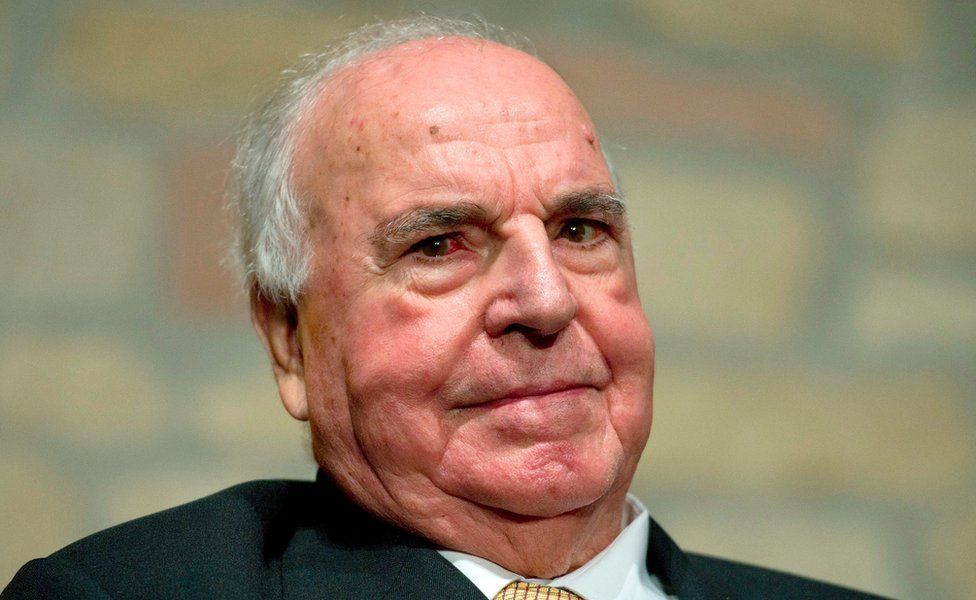Helmut Kohl: Germany's 'under-appreciated' political giant
- Published

Now that Helmut Kohl has died, the German people and their longest-serving post-war chancellor will never be able to make their peace.
Mr Kohl felt under-appreciated until the end and even those Germans who respected him never found a place in their hearts for him.
"Germany has much to thank him for," Chancellor Angela Merkel said in 2014, when her predecessor turned 85.
She clearly felt an ungenerous country needed reminding.
Emotional bond
Helmut Kohl was a man of the moment, a brilliant tactician, ready to grasp what was coming.
Only a few months after the Berlin Wall had collapsed in 1989 - which he too had not anticipated - Mr Kohl went to Dresden, in what was then East Germany.
His brief speech, again and again interrupted by shouts of "Helmut! Helmut!" marked a turning point. In that cold night, in front of the Frauenkirche, an emotional bond was forged between Mr Kohl and East Germans that sped the country towards unification.
Politics is all about presence, and Mr Kohl, a big man, was an expert in corporeal politics.
He always sought to draw people near, because then he was at his best. He spent hours cajoling the party ranks on the phone, and he enjoyed serving his beloved Saumagen - or stuffed pig's stomach - to foreign dignitaries, whether they liked it or not.
He held French leader Francois Mitterrand's hand over graves at the World War One battlefield of Verdun.
Physical politics
In the photographs the French president will forever look conspicuously small next to the German chancellor.
It was a form of physical politics that worked well with men like then US President Bill Clinton or Russia's Boris Yeltsin, who invited Mr Kohl to join him in the sauna. Not surprisingly, it did not sit well with then UK Prime Minister Margaret Thatcher.
To a Germany that had ceased to be politically ambitious, Helmut Kohl was, for the longest time, the perfect chancellor. He looked like a man in control, while managing to make the power in his hands seem harmless.
He talked reforms, without bothering the country with too many of them.
His aura was that of a trustworthy stalwart, and his success helped him shrug off the elites' view of him as a provincial buffoon. It embittered him nevertheless.
Helmut Kohl defined Germany's politics for a generation through the sheer force of his persona and his political genius.
Yet after he was forced out of office in 1998, the country rarely looked back.
The Christian Democrats stripped him of the party's honorary chairmanship because of his role in a party slush fund scandal and the difficulties of the euro - devised by Mr Kohl as Germany's ultimate commitment to European integration.
These setbacks have overshadowed what he considered his greatest achievement.
His European Union, like much of his politics, was not really meant to work without him. And it didn't. Soon the global threats of terror and financial crises made him look to many Germans like a man from a different era.
Moreover, a debilitating fall in 2008 had robbed Mr Kohl of the chance to defend his political legacy.
He remained silent too when his sons wrote bestsellers disassociating themselves from their bullying father.
As his first wife Hannelore - with whom he had once authored a cookbook - had killed herself, he was now looked after by his much younger second wife in his old bungalow home in Oggersheim, in the western state of Rhineland-Palatinate.
In the end, Mr Kohl - whose politics were formed so much around relationships - had run out of friends and foes alike.
In 2014 Helmut Kohl visited the Frankfurt Book Fair once more to present a book on his own account of the events of 1989-90.
Despite being close to incoherent, he spoke a few words.
Seeing their once mighty chancellor reduced to a frail figure in a wheelchair made most Germans feel uncomfortable.
A Dutch journalist witnessing the scene saw something else: a historical figure. "How moving," he said.